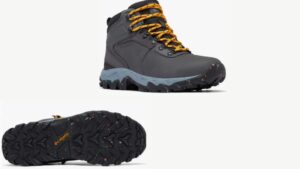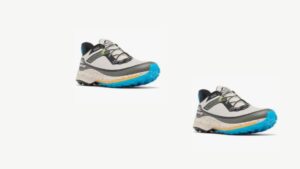TABLE OF CONTENTS
ToggleWhat Is Hardy in Shoes (HRTY)?
Hardy is a term often associated with footwear designed to withstand tough conditions and provide exceptional durability. In the world of shoes, “Hardy” usually signifies that a particular brand or style is built to last, offering resilience and sturdiness. But what exactly does that mean for you?
Hardy shoes are typically crafted with high-quality materials and expert construction techniques to ensure they endure wear and tear. This means they’re ideal for activities that put a lot of stress on your footwear, such as hiking, heavy-duty work, or outdoor adventures. Think of Hardy shoes as your reliable companion for demanding environments.==>> Check out the latest Hardy shoe models that you need here

Key Features of Hardy Shoes
- Durable Materials: Hardy shoes are made from robust materials like high-grade leather, tough synthetic fabrics, or reinforced rubber. These materials are chosen specifically for their ability to resist abrasion and last longer under tough conditions.==>> Check out the latest Hardy shoe models that you need here
- Reinforced Construction: The construction of Hardy shoes often includes features like double stitching, reinforced toe caps, and durable soles. These elements are designed to enhance the shoe’s lifespan and provide extra protection.
- Comfort and Support: Despite their rugged build, Hardy shoes don’t compromise on comfort. Many models come with cushioned insoles, ergonomic designs, and ample support to ensure your feet stay comfortable even during prolonged wear.
- Versatility: Hardy shoes are designed to be versatile. Whether you’re climbing a mountain or navigating a construction site, these shoes are built to adapt and perform.==>> Check out the latest Hardy shoe models that you need here

Columbia Montrail
Why Choose Hardy Shoes?
If you’re someone who values longevity and performance in your footwear, Hardy shoes might be the perfect choice for you. Their robust construction ensures that you’re investing in a pair of shoes that will stand up to challenging conditions. Additionally, the comfort and support offered by these shoes mean you won’t have to sacrifice ease of wear for durability.
Hardy shoes offer a blend of toughness and comfort that can be crucial for those who demand more from their footwear.==>> Check out the latest Hardy shoe models that you need here
Examples of Hardy Shoes
To give you a clearer picture of what Hardy shoes look like in action, let’s explore some specific examples that illustrate the concept. These examples showcase how different brands and styles embody the characteristics of Hardy footwear.==>> Check out the latest Hardy shoe models that you need here
1. Timberland PRO Series
The Timberland PRO Series is a prime example of Hardy shoes designed for tough conditions. Known for their rugged build and durability, these work boots are crafted with premium leather and feature a reinforced toe for added protection. The anti-fatigue technology in the insoles ensures that your feet stay comfortable even during long hours of standing or walking.==>> Check out the latest Hardy shoe models that you need here
Key Features:
- Full-grain leather upper
- Steel-toe protection
- Slip-resistant outsole
- Anti-fatigue technology==>> Check out the latest Hardy shoe models that you need here
2. Salomon Quest 4D GTX
For outdoor enthusiasts, the Salomon Quest 4D GTX is a great example of Hardy shoes that can handle rugged terrain. These hiking boots are made with Gore-Tex waterproof material and have a robust design to tackle various outdoor challenges. The 4D Advanced Chassis provides stability and control on uneven surfaces, making these boots perfect for long hikes or demanding trails.==>> Check out the latest Hardy shoe models that you need here
Key Features:
- Gore-Tex waterproof lining
- 4D Advanced Chassis for stability
- High-traction Contagrip outsole
- Cushioned midsole for comfort
3. Red Wing Iron Ranger
The Red Wing Iron Ranger is another excellent example of Hardy footwear, particularly in the realm of casual yet durable boots. These boots are crafted from premium, oil-tanned leather and feature a triple-stitched construction that enhances their durability. The Vibram outsole provides reliable traction, making them suitable for both work and casual wear.
Key Features:
- Oil-tanned leather upper
- Triple-stitched construction
- Vibram outsole
- Steel shank for added support
4. Dr. Martens 1460 Pascal Velvet
Dr. Martens has a reputation for durability, and the 1460 Pascal Velvet boots are a stylish example of Hardy footwear. These boots are made from high-quality velvet leather and feature the iconic Dr. Martens air-cushioned sole. They’re known for their long-lasting comfort and resistance to wear, making them a favorite among those who need both style and substance.==>> Check out the latest Hardy shoe models that you need here
Key Features:
- Velvet leather upper
- Air-cushioned sole
- Goodyear welt construction
- Classic Dr. Martens design
Drilling Deeper: Hardy Shoes vs. Regular Shoes
When deciding between Hardy shoes and more typical footwear options, it’s important to understand how they stack up against each other in terms of durability, comfort, and performance. Let’s break down the key differences to help you make an informed decision.
1. Durability
Hardy Shoes:
Hardy shoes are built to withstand extreme conditions and heavy use. They often feature high-quality, abrasion-resistant materials such as full-grain leather or reinforced synthetics. Additionally, they include construction techniques like double stitching, reinforced toe caps, and rugged outsoles designed to endure rough environments. This makes Hardy shoes ideal for demanding jobs or outdoor activities.
Regular Shoes:
Regular shoes, which might include everyday sneakers or casual footwear, are usually designed with standard materials that may not offer the same level of durability. While they might be comfortable and stylish, they often lack the reinforced features found in Hardy shoes. Regular shoes are generally intended for light to moderate use and may wear out more quickly under strenuous conditions.==>> Check out the latest Hardy shoe models that you need here
2. Comfort
Hardy Shoes:
Comfort in Hardy shoes is engineered to handle prolonged use in tough conditions. Many models come with advanced cushioning systems, ergonomic designs, and supportive insoles to keep your feet comfortable despite the rugged build. For instance, boots like the Timberland PRO Series include anti-fatigue technology that helps reduce foot fatigue.
Regular Shoes:
Regular shoes are typically designed with comfort in mind, but the focus is often on everyday wear rather than heavy-duty usage. They might feature cushioned soles and flexible uppers for casual wear but may lack the additional support or cushioning required for intensive activities. Comfort is generally more about ease of wear rather than resilience under stress.
3. Protection
Hardy Shoes:
Protection is a key feature of Hardy shoes. Many are equipped with safety elements such as steel toe caps, reinforced shanks, and slip-resistant outsoles to protect your feet from hazards. This is particularly important in industrial or construction environments where foot injuries are a concern.
Regular Shoes:
Protection in regular shoes is often minimal, focusing more on aesthetics and everyday comfort. While some regular shoes may have basic toe protection or cushioned soles, they generally do not offer the same level of safety features found in Hardy footwear. This makes them less suitable for environments where foot protection is crucial.
4. Versatility
Hardy Shoes:
Hardy shoes are versatile in their ability to adapt to various tough environments. Whether it’s a rugged hiking trail or a heavy-duty worksite, Hardy shoes are designed to perform reliably. However, their rugged appearance might make them less suitable for formal or casual settings.
Regular Shoes:
Regular shoes tend to be more versatile in terms of style and use. They are designed for a range of everyday activities and can often transition seamlessly between different environments, from casual outings to office wear. However, they may not offer the specialized performance or protection needed for more demanding situations.==>> Check out the latest Hardy shoe models that you need here
Comparison Table: Hardy Shoes vs. Regular Shoes
| Feature | Hardy Shoes | Regular Shoes |
|---|---|---|
| Durability | Built with high-quality, abrasion-resistant materials (e.g., full-grain leather, reinforced synthetics). Designed to withstand tough conditions. | Made from standard materials that may wear out more quickly under stress. Intended for everyday use. |
| Comfort | Engineered for prolonged use with advanced cushioning systems, ergonomic designs, and supportive insoles. | Designed for everyday comfort, often featuring cushioned soles and flexible uppers. May not provide specialized support for intensive use. |
| Protection | Includes safety features such as steel toe caps, reinforced shanks, and slip-resistant outsoles. Ideal for hazardous environments. | Limited protection, focusing more on aesthetics and general comfort. May lack specialized safety features. |
| Versatility | Suitable for demanding environments (e.g., hiking, industrial work) but less appropriate for formal or casual settings. | Versatile in style and use, suitable for various everyday activities and environments, but may not perform well under extreme conditions. |
| Price Range | Generally higher due to specialized materials and construction. | Typically more affordable, depending on brand and design. |
Key Notes and Considerations
1. Purpose and Use
- Hardy Shoes: Best for individuals who need footwear that can endure rough conditions and provide substantial protection. Ideal for outdoor adventures, construction work, or any situation where durability is crucial.
- Regular Shoes: Better suited for everyday wear and casual settings. They offer comfort and style for general use but may not withstand heavy-duty applications.
2. Material Quality
- Hardy Shoes: Made from premium materials designed for durability and longevity. Look for features like reinforced stitching, tough outsoles, and high-grade leather or synthetic fabrics.
- Regular Shoes: Typically constructed from standard materials that prioritize comfort and aesthetics over durability. Less focus on heavy-duty features.
3. Comfort Features
- Hardy Shoes: Focus on providing long-lasting comfort under strenuous conditions. Features might include advanced cushioning, ergonomic designs, and additional support elements.
- Regular Shoes: Emphasize everyday comfort with cushioned insoles and flexible materials. May not have the same level of support for extended wear or challenging environments.
4. Safety and Protection
- Hardy Shoes: Often equipped with safety features such as steel toe caps and slip-resistant soles to protect against hazards. Essential for environments with potential foot injuries.
- Regular Shoes: Limited safety features, focusing more on general comfort and style. May not provide adequate protection in hazardous conditions.
5. Price Considerations
- Hardy Shoes: Generally more expensive due to the high-quality materials and construction. Consider the long-term investment if durability and protection are a priority.
- Regular Shoes: Usually more affordable, with a range of options for different budgets. Suitable for those seeking comfort and style without the need for specialized features.
FAQs on Hardy Shoes vs. Regular Shoes
1. What makes Hardy shoes different from regular shoes?
Hardy shoes are designed for durability and performance in tough conditions, featuring high-quality materials and safety features like steel toe caps and slip-resistant soles. Regular shoes are typically made for everyday use, focusing on comfort and style without the specialized features found in Hardy footwear.
2. Are Hardy shoes worth the investment?
If you need footwear that can endure extreme conditions and provide substantial protection, Hardy shoes are worth the investment. They offer durability, comfort, and safety features that can be crucial for high-stress environments. However, if your needs are more casual, regular shoes might be more cost-effective and suitable.
3. Can Hardy shoes be used for everyday wear?
While Hardy shoes are designed for rugged environments, many models can be used for everyday wear if you appreciate their durability and style. However, they may be less versatile for formal or casual settings compared to regular shoes.
4. How should I choose between Hardy shoes and regular shoes?
Consider your primary needs: If you require footwear that can handle demanding conditions and provide protection, Hardy shoes are a better choice. For general comfort and style suitable for everyday activities, regular shoes are more appropriate. Evaluate factors such as durability, comfort, protection, and versatility.
5. Are Hardy shoes comfortable for long-term wear?
Yes, Hardy shoes are designed with comfort in mind for long-term use, featuring advanced cushioning systems, ergonomic designs, and supportive elements. They aim to provide comfort even under challenging conditions, making them suitable for prolonged wear.
6. What types of activities are Hardy shoes best for?
Hardy shoes are ideal for activities such as hiking, construction work, and other environments where durability and protection are essential. They are built to handle rough terrain, hazardous conditions, and heavy use.
7. How do regular shoes compare in terms of durability?
Regular shoes are generally less durable than Hardy shoes, as they are made from standard materials intended for everyday use. They may wear out more quickly under stress and are not designed to withstand extreme conditions or heavy-duty applications.
8. Can Hardy shoes be used in formal settings?
While Hardy shoes are designed for durability and functionality, their rugged appearance may not be suitable for formal settings. If you need footwear for formal occasions, regular shoes or more stylish alternatives might be a better choice.
Final Words
Choosing the right footwear is crucial for ensuring comfort, protection, and performance based on your specific needs. Hardy shoes stand out for their durability, safety features, and comfort under strenuous conditions, making them a great choice for demanding environments. On the other hand, regular shoes offer versatility, style, and affordability for everyday use.
By understanding the key differences and evaluating your requirements, you can make a well-informed decision. Whether you’re investing in Hardy shoes for rugged adventures or selecting regular shoes for casual wear, the right pair will enhance your experience and keep you comfortable throughout your activities.

Hey there, I’m Mike, the brains behind Reviewmedium.com. When I’m not busy running the show, you can usually find me obsessing over my ever-growing collection of shoes. Yep, I’m that guy who’s pretty picky about what goes on his feet.
Over the years, I’ve dipped my toes into a wide range of brands – from the classics like Timberland and Converse to the trendsetters like Nike and Adidas. You name it, I’ve probably laced it up.
My journey as a shoe aficionado inspired me to create this blog. Here, I spill the beans on all things footwear, straight from my hands-on experience and meticulous research.
And hey, if you’re here, chances are you share the same passion for kicks as I do. Well, you’re in luck! This blog is your ultimate destination for everything shoe-related. From in-depth reviews to handy buying guides, consider it your go-to resource for stepping up your shoe game. So kick back, relax, and let’s dive into the world of footwear together.
Related Posts
- FLXBL: Flexible Meaning in shoes Explained
When it comes to shoes, there's a lot more to them than just style and…
- VSTL: Vestal Meaning in shoes Explained
In this topic, I’m going to talk about the fascinating world of shoes and how…
- TRCT: Traction Meaning in shoes Explained
In this topic, I’m going to talk about traction in shoes, drawing from my own…
- RLM: Realm Meaning in shoes Explained
In this topic, I’m going to talk about the fascinating realm of shoes based on…
- DPCH: Dispatch Meaning in shoes Explained
In this topic, I’m going to talk about DPCH, also known as Dispatch, and its…
- STNDRD: Standard Meaning in shoes Explained
In this topic, I’m going to talk about STNDRD: Standard in shoes, drawing from my…
- TSKT: Tasket Meaning in shoes Explained
In this topic, I’m going to talk about the fascinating world of shoes and share…
- DRK: Dark Meaning in shoes Explained
When it comes to shoes, I’ve seen and experienced a lot of different trends and…
- MLTR: Miler Meaning in shoes Explained
When it comes to shoes, there's a lot more than just picking out a pair…
- TRD: Tread Meaning in shoes Explained
Shoes are more than just a fashion statement; they're an essential part of our daily…
- CFD: Confined Meaning in shoes Explained
In this topic, I’m going to talk about CFD: Confined, and how it relates to…
- TRDNL: Traditional Meaning in shoes Explained
If you’re anything like me, you probably have a bit of a shoe obsession. In…
- GLTN: Gelatin Meaning in shoes Explained
In this topic, I’m going to talk about the role of gelatin in shoes based…
- CTTN: Cotton Meaning in shoes Explained
When it comes to shoes, there’s a lot more going on than just the style…
- SMBL: Symbol Meaning in shoes Explained
When it comes to shoes, there's a lot more to them than just style and…
